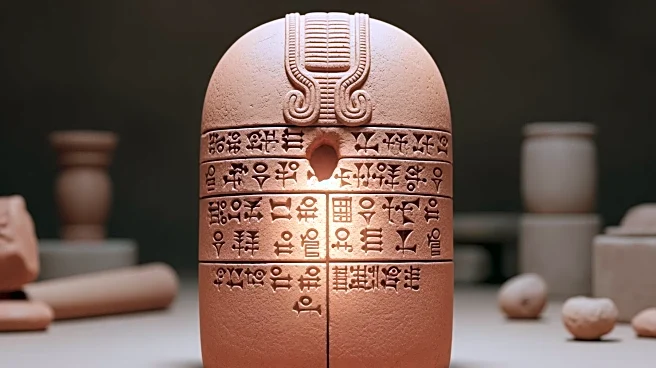What's Happening?
A 3,000-year-old Babylonian hymn has been rediscovered through artificial intelligence, marking a significant historical and technological achievement. Professor Enrique Jiménez of LMU, in collaboration with the University of Baghdad, identified the hymn and linked
it to 30 additional manuscripts using AI. The hymn, which describes Babylon's majesty and insights into its inhabitants' lives, was preserved on cuneiform tablets. The LMU-Baghdad collaboration aims to decipher and preserve these tablets, with AI playing a crucial role in matching fragmented pieces. This discovery highlights the hymn's popularity in its time, as it was widely copied by children at school.
Why It's Important?
The rediscovery of the Babylonian hymn through AI underscores the potential of technology in historical preservation and research. It offers new insights into Babylonian society, including the roles of women and societal values like hospitality toward foreigners. This technological advancement not only preserves cultural heritage but also enriches our understanding of ancient civilizations. The project demonstrates the power of AI in connecting historical fragments, which could revolutionize the study of ancient texts and artifacts, providing a more comprehensive view of historical societies.
What's Next?
The ongoing collaboration between LMU and the University of Baghdad aims to continue deciphering and preserving Babylonian texts. The use of AI in this process is expected to accelerate the identification and reconstruction of other historical manuscripts. This could lead to further discoveries about Babylonian culture and society, potentially influencing modern interpretations of ancient civilizations. The project may also inspire similar initiatives in other regions, utilizing AI to uncover and preserve historical artifacts.
Beyond the Headlines
The use of AI in historical research raises ethical considerations regarding the interpretation and representation of ancient texts. As technology becomes more integrated into cultural preservation, it is crucial to ensure that AI tools are used responsibly and accurately. This development also highlights the importance of international collaboration in preserving global heritage, fostering cross-cultural understanding and appreciation.

















